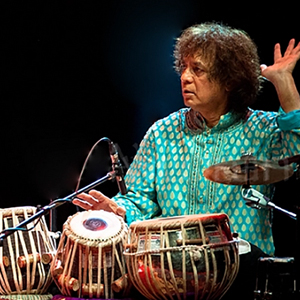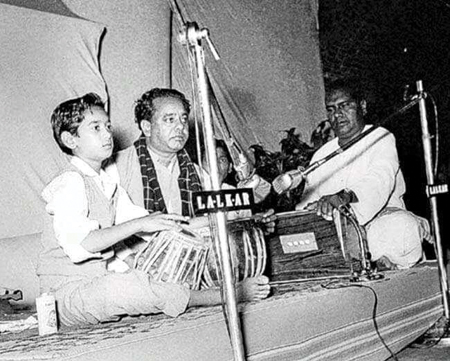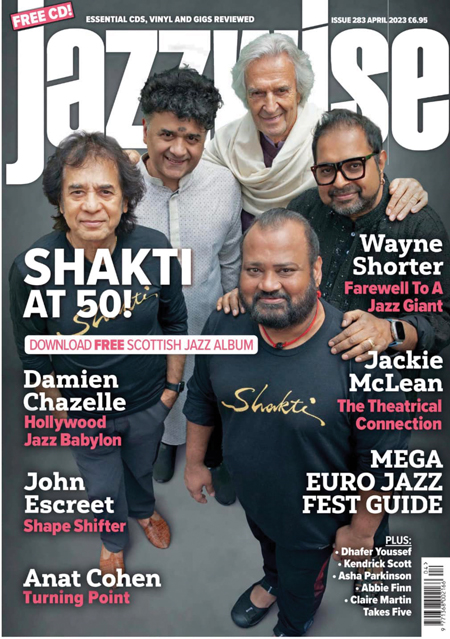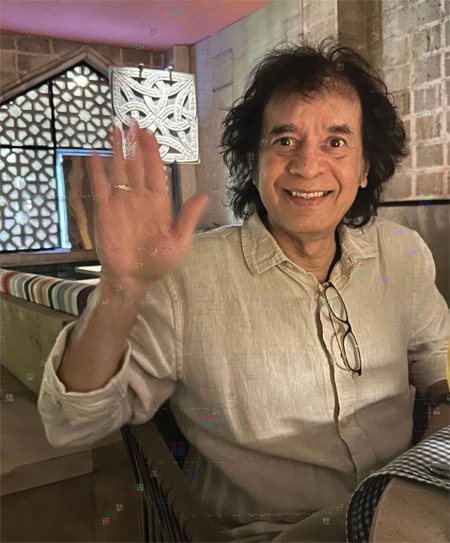Tribute: Zakir Hussain's Life in Rhythm

The tabla maestro who redefined global music.
“When any influential artist leaves, it is not as if the vessel of knowledge becomes empty. The knowledge (vidya) given by them, the musical notes (sur) given by them, and the expression of emotion contained in their words (bolon ka izhar), all of these are very much present. We come naked into the world and leave naked. The ones who leave something behind, after their lives, are worthy of being considered geniuses.” – Ustad Zakir Hussain.
 On December 15, 2024, the world lost a great musical genius—the legendary tabla maestro Ustad Zakir Hussain. At the age of 73, Hussain’s passing in San Francisco reverberated across the global music community, leaving an immense void. Yet, his legacy remains timeless. A consummate artist who was both gifted and humble, Zakir Hussain not only elevated the tabla to new heights but also put Indian classical music firmly on the world map. Through his artistry, he brought the rhythms of India to every corner of the globe, transforming the tabla from a traditional instrument into a versatile force that transcended genres.
On December 15, 2024, the world lost a great musical genius—the legendary tabla maestro Ustad Zakir Hussain. At the age of 73, Hussain’s passing in San Francisco reverberated across the global music community, leaving an immense void. Yet, his legacy remains timeless. A consummate artist who was both gifted and humble, Zakir Hussain not only elevated the tabla to new heights but also put Indian classical music firmly on the world map. Through his artistry, he brought the rhythms of India to every corner of the globe, transforming the tabla from a traditional instrument into a versatile force that transcended genres.
[Right] A child prodigy, Zakir’s ears had been reverberating with the sound of tabla and its rhythmic vocals right from the womb. He is seen here as a pre-teen performing with his father, Ustad Alla Rakha Qureshi, who too was a legend in his time. (Photo X/@ZakirHTabla)
Born in the lap of divine rhythm
Zakir Hussain was born on March 9, 1951, to the renowned tabla maestro, Ustad Alla Rakha, and his wife, Bavi Begum, in Mumbai. From the very beginning, Zakir’s destiny seemed intricately tied to rhythm. Just two days after his birth, he was cradled in the arms of his father, Ustad Alla Rakha, a devout Muslim, who went against tradition by whispering rhythmic phrases into his newborn son’s ears instead of prayers. When his wife questioned this unconventional act, Ustad Alla Rakha explained that he was a worshipper of the goddess of arts and learning, Ma Saraswati, and Lord Ganesh, and that the rhythmic phrases were, indeed, his prayers. He expected and believed that his son would do the same in his life.
 For months, Ustad Alla Rakha continued chanting rhythmic patterns to his son. By the time Hussain was three, he had already been introduced to various rhythms. At the age of seven, he began formal lessons under his father’s guidance. Every morning at 2:30 AM, while the world slept in peace, Hussain learned the art of playing tabla from his father, not only repeating rhythmic phrases but also absorbing the history behind the musical movements. These formative years sowed the seeds of an extraordinary performer who would later become a global icon.
For months, Ustad Alla Rakha continued chanting rhythmic patterns to his son. By the time Hussain was three, he had already been introduced to various rhythms. At the age of seven, he began formal lessons under his father’s guidance. Every morning at 2:30 AM, while the world slept in peace, Hussain learned the art of playing tabla from his father, not only repeating rhythmic phrases but also absorbing the history behind the musical movements. These formative years sowed the seeds of an extraordinary performer who would later become a global icon.
[Left] A young Hussain from the booklet of a 1980s CD.
Confidence of a prodigy
As Hussain watched his father tour with legendary artists like sitar virtuoso Pandit Ravi Shankar and sarod maestro Ustad Ali Akbar Khan, he dreamed of following in their footsteps. His passion led him to an unforgettable act of independence. As a schoolboy, without properly informing his parents, Hussain embarked on a two-and-a-half-day train journey to Patna, Bihar, to participate in a music festival in place of his father. The festival promoter  who arrived to pick him up was astonished to find a young boy in a school uniform with a tabla set, introducing himself as the performer for the music festival. This experience of performing before an audience of over 10,000 music lovers was an early testament to Hussain’s prodigious talent. When he returned to Mumbai, his mother, though concerned, was moved by his dedication when he presented to her the 200 rupees he had earned from the Patna performance.
who arrived to pick him up was astonished to find a young boy in a school uniform with a tabla set, introducing himself as the performer for the music festival. This experience of performing before an audience of over 10,000 music lovers was an early testament to Hussain’s prodigious talent. When he returned to Mumbai, his mother, though concerned, was moved by his dedication when he presented to her the 200 rupees he had earned from the Patna performance.
[Right] Hussain performing in Munich, Germany, 2001. (Photo Sven Petersen/ Wikicommons)
A global journey begins.
By the time Zakir was 12, he was already a seasoned performer, playing for Bollywood films and performing at concerts. At 18, he toured Europe; and by 19, he was summoned for his first opportunity to perform with Bharat Ratna Pandit Ravi Shankar in the United States.
Arriving in the U.S. in the early 1970s with only eight dollars in his pocket, Zakir’s extraordinary talent quickly garnered attention. Indian classical music and spirituality were beginning to resonate in the U.S., thanks to maestros like Ustad Ali Akbar Khan and Pandit Ravi Shankar, who had laid the foundation for Indian music to blossom in America. Hussain’s contribution was immeasurable—he became pivotal in bridging the gap between Indian classical music and the Western world.
He taught tabla at the Ali Akbar College of Music in San Francisco and the University of Washington in Seattle. He collaborated with artists across genres, including Mickey Hart of The The Grateful Dead, George Harrison of Beatles, Van Morrison, Yo-Yo Ma, and many others.He brought Indian classical music to a global audience and earned accolades from all over the world.
 [Left] Hussain had eight national tours in the U.S. with the celebrated santoor artist, Pandit Shiv Kumar Sharma. (Photo YouTube/Small World Music)
[Left] Hussain had eight national tours in the U.S. with the celebrated santoor artist, Pandit Shiv Kumar Sharma. (Photo YouTube/Small World Music)
While Hussain did eight tours with the celebrated Santoor artist Pandit Shiv Kumar Sharma in the United States, his musical travels were not confined there. He routinely traveled to India and performed solo on the tabla and also provided accompaniment to top Indian classical artists that included both vocalists and instrumentalists such as the flutist, Pandit Hari Prasad Chaurasia, and the vocalist, the late Bharat Ratna Pandit Bhimsen Joshi. Hussain maintained tradition well while being open to innovation. His music compositions for the Bollywood film Saaz and his acting role in the same movie were received well by audiences.
A visionary of Indian music
While his father, Ustad Alla Rakha, is credited with introducing the tabla to Western audiences, it was Zakir Hussain who, along with his brothers, Taufiq Qureshi and Fazal Qureshi, truly redefined the instrument’s role in world music. Traditionally used as an accompaniment in North Indian classical music, the tabla’s role expanded under Hussain’s vision. It became an essential instrument not only in Indian music but also in jazz, fusion, and world music, gaining recognition on the global stage.
In 1973, Hussain, along with guitarist John McLaughlin, violinist L. Shankar, and percussionist T.H. ‘Vikku’ Vinayakram, created the revolutionary album, Shakti. This fusion of jazz and Indian classical music represented a groundbreaking moment in world music. Over the next five decades, Hussain’s collaborations spanned genres and cultures, resulting in over 150 recordings that cemented his place as one of the most recorded percussionists in history.
Fifty years later, the Shakti band, with a new cast and crew, released a studio recording in June 2023 and went on a world tour to promote their latest album, This Moment. The album won the Grammy for Best Global Music Album at the 66th Annual Grammy Awards held in February 2024. Other notable awards included an honorary doctorate conferred on Hussain by Berklee College of Music and the Padma Vibhushan award conferred by the Indian Government.
 An entertainer with an intuitive connection with music lovers
An entertainer with an intuitive connection with music lovers
Zakir Hussain’s performances were not just musical displays; they were events that brought audiences to the very heartbeat of the tabla. His ability to communicate with listeners, whether seasoned connoisseurs or casual enthusiasts, was unparalleled. Hussain’s ability to express nature’s beauty and everyday occurrences through tabla—like the movement of deer or the sound of a passing train—ensured that audiences, young and old, were always engaged. His innate sense of humor, his visual storytelling, and his spontaneous ability to simplify complex rhythms made every performance a unique experience.
[Left] Shakti, the brainchild of Zakir Hussain and John McLaughlin, has been well-recognized in the world press as an iconic fusion band with an impressive footprint in world music.
Having witnessed his performances at the historic Sanders Theatre in Cambridge, Massachusetts, I observed not only his unparalleled skills as an entertainer but also his mentorship. Hussain frequently provided a platform for younger musicians such as santoor artist Rahul Sharma, sitarist Niladri Kumar, flutist Rakesh Chaurasia, and vocalist Shankar Mahadevan, among many others. After every concert, he quietly allowed his collaborators to take the limelight while he humbly stood in the background, embodying the true spirit of a mentor. His love for Indian folk music also led him to introduce folk music groups from all across India, such as Rajasthan’s Manganiars, to international audiences.
A legacy of far more than rhythm
Despite his immense success, Zakir Hussain never considered himself an expert. He remained, in his own words, a “lifelong student.” He often said, “Every day is a learning day. There is no single day you can look in the mirror and say you know everything.” His unwavering dedication to learning, growing, and evolving as an artist was the foundation of his extraordinary career.
 Until the last day of his life, Hussain’s wife, Antonia Minnecola, (a Kathak dancer and disciple of the legendary danseuse Sitara Devi) supported his art unconditionally and was his manager. “My wife is the pillar of strength for me. She is, in some ways, responsible for the way I have shaped up. I have two fantastic daughters. My mother, more than my father, has guided me to where I am, and to have a father like I have – oof!” Hussain said in an interview.
Until the last day of his life, Hussain’s wife, Antonia Minnecola, (a Kathak dancer and disciple of the legendary danseuse Sitara Devi) supported his art unconditionally and was his manager. “My wife is the pillar of strength for me. She is, in some ways, responsible for the way I have shaped up. I have two fantastic daughters. My mother, more than my father, has guided me to where I am, and to have a father like I have – oof!” Hussain said in an interview.
“I am not a rich man. But I have no regrets. The world has been kind. I have had a great life. I would do everything again the same way,” said Hussain to me in an interview for Khabar magazine earlier this year.
[Left] “Alvida, Ustaad!” (“Farewell, Maestro!”) (Photo Zakir Hussain Instagram @zakirhq9)
Though he is no longer with us, Zakir Hussain’s music will continue to echo through time. His contributions to Indian classical music, his vision of adapting the tabla to new genres, his belief in the potential of music to create healing in a troubled world, and his spirit of kindness and generosity have left an indelible mark on the world. May Ustad Zakir Hussain’s soul dance in eternal rhythm, forever inspiring musicians, learners, and lovers of music around the world.
Shuchita Rao is a Hindustani vocalist and educator based in South Florida. She enjoys freelancing on subjects related to Indian art, music, and culture. Find more about her at www.shuchitarao.com
Enjoyed reading Khabar magazine? Subscribe to Khabar and get a full digital copy of this Indian-American community magazine.
blog comments powered by Disqus










